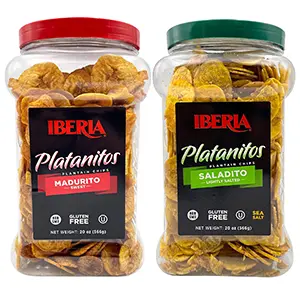
Many dog owners are curious about what human foods are safe to share with their canine companions. A common question that arises is, “Can dogs eat plantain chips?” At first glance, these crispy, delicious snacks might seem like a simple treat to share with your pup. However, the answer isn’t straightforward, and there are important considerations to take into account. In this article, we’ll dive deep into the topic of dogs and plantain chips, examining both the potential risks and the very limited benefits. By understanding more about what makes these chips problematic for pets, you’ll be better equipped to make healthy dietary choices for your dog, ensuring their long-term health and well-being.
What Are Plantain Chips?

Plantain chips, also called alloco, dodo, or chicharritas, are a tasty snack made by thinly slicing green plantains and frying them until they turn crispy and golden. These chips are then seasoned for added flavor. Plantains are well-suited for tropical climates where potatoes struggle to grow due to the heat. As a result, they serve as a great alternative source of carbohydrates. Enjoyed in tropical regions like Africa, the Americas, and the Caribbean, plantain chips have become a popular snack choice.
Can Dogs Eat Plantain Chips?
It’s best not to give your dog plantain chips. While plantains themselves can be a healthy treat when cooked plainly and given in moderation, plantain chips typically aren’t suitable for dogs due to the way they are prepared.
Plantain chips are usually fried and often contain high amounts of salt, spices, or other flavorings that can be harmful to dogs. The high fat content from frying can lead to gastrointestinal upset in dogs, including diarrhea or vomiting. Additionally, excessive salt intake can be particularly dangerous for dogs, potentially leading to more serious conditions like sodium ion poisoning.
If you want to treat your dog with plantains, it’s best to stick to plain, cooked plantains with no added ingredients. Always introduce any new food into your dog’s diet gradually and in small amounts to monitor how they react to it. If you have any concerns or your dog has specific dietary restrictions, consulting your veterinarian is a wise step.
Related Post: Can Dogs Eat French Toast? Risks and Guidelines
The Risks of Feeding Plantain Chips to Dogs
As a veterinarian, I would advise against feeding plantain chips to dogs due to several health risks associated with this type of snack. Here are the primary concerns:
- High Fat Content: Plantain chips are typically fried, which increases their fat content significantly. High-fat foods can be difficult for dogs to digest and may lead to gastrointestinal upset such as diarrhea and vomiting. Over time, frequent consumption of fatty foods can contribute to more serious conditions like pancreatitis, a painful and potentially life-threatening inflammation of the pancreas.
- Salt and Seasonings: Plantain chips often contain added salt and other seasonings to enhance flavor. While these might make the chips tastier for humans, they are not suitable for dogs. Excessive salt intake can lead to sodium ion poisoning in dogs, symptoms of which include vomiting, diarrhea, excessive thirst or urination, lethargy, and abnormal fluid accumulation within the body. Other seasonings, such as garlic or onion powder, are toxic to dogs and can lead to serious health issues.
- Choking Hazard: Depending on how they are cut, plantain chips can also pose a choking risk, especially for smaller dogs or those that tend to gulp their food without chewing properly.
- Caloric Content: Like any treat, plantain chips add extra calories to your dog’s diet, which can contribute to weight gain if not properly managed. Obesity in dogs can lead to a host of health problems, including joint issues, diabetes, and reduced lifespan.
For these reasons, it is safer to stick to dog-friendly treats that are designed to be both safe and nutritionally beneficial for your pet. If you want to share plantains with your dog, opt for cooking them plainly (boiled or baked without any added ingredients) and offering them in moderation. Always consult your vet before introducing new foods into your dog’s diet to ensure they are safe and appropriate for your particular pet.
Related Post: Can Dogs Eat Cheerios? Safe or Risky Snacking?
Benefits of Plantain Chips for Dogs
As a veterinarian, it’s important to note that plantain chips, as typically prepared and consumed by humans, do not offer significant health benefits for dogs. The primary reasons are their preparation method and the added ingredients, which are not conducive to canine health. However, if we consider plain cooked plantains (not the fried or commercially packaged chips), there are some potential benefits, albeit minor, when served properly:
- Nutritional Content: Plantains, in their plain, cooked form, are rich in vitamins like A, C, and B6, which are beneficial for a dog’s immune system, skin health, and nerve function. They also provide dietary fiber, which can aid in digestion.
- Potassium: Plantains are a good source of potassium, which is important for muscle and nerve function as well as maintaining a healthy balance of fluids in the body.
That said, the typical commercial preparation of plantain chips involves frying and seasoning, which negates these benefits due to the reasons listed:
- High fat and calorie content: Fried snacks contribute to an increased risk of obesity and conditions like pancreatitis, as previously mentioned.
- Added salt and spices: These can be harmful to dogs, potentially leading to sodium ion poisoning and irritation of the digestive system.
In summary, while plain cooked plantains can be a healthy treat in moderation, plantain chips, as they are generally made and sold, are not recommended for dogs due to the risks posed by their preparation and seasoning. Always consult with a veterinarian before introducing any new food items into your dog’s diet to ensure they are safe and suitable for your pet’s specific health needs.
Related Post: Can Dogs Eat Orange Chicken?
Can Dogs Safely Enjoy Plantains Chips as a Treat?
As a veterinarian, I would advise against using plantain chips as a treat for dogs for several reasons. While plain, cooked plantains can be safely offered to dogs in small quantities as a treat, plantain chips—as they are typically prepared for human consumption—do not fit the same profile due to their preparation and ingredients.
Here are the main concerns with feeding dogs plantain chips:
- High Fat Content: Plantain chips are usually fried, which significantly increases their fat content. Foods high in fat can be hard for dogs to digest and might lead to gastrointestinal issues like diarrhea and vomiting. More seriously, frequent consumption of high-fat foods can lead to pancreatitis, an inflammation of the pancreas that can be painful and life-threatening.
- Salt and Seasonings: Commercial plantain chips often contain added salt, garlic, onion powder, or other spices to enhance their flavor. High salt intake can be harmful to dogs, potentially leading to conditions like sodium ion poisoning, which manifests with symptoms such as vomiting, diarrhea, excessive thirst or urination, and lethargy. Moreover, ingredients like onion and garlic are toxic to dogs and can lead to other serious health issues.
- Choking Hazard: The crispiness and sometimes irregular shapes of plantain chips could pose a choking risk, especially for smaller dogs or those that tend to eat quickly without properly chewing their food.
- Extra Calories: Like any snack not specifically designed for dogs, plantain chips add additional calories to your dog’s diet, which, if not accounted for, could contribute to unhealthy weight gain. Obesity in dogs is linked with various health problems, including diabetes, heart disease, and joint issues.
Considering these factors, it’s best to opt for treats that are specifically formulated for dogs. These treats are designed to be safe and healthy, providing the nutrients dogs need without the risks associated with human snack foods. If you’re looking to offer your dog a plantain, it should be plain, cooked without any additives, and offered in moderation as part of a balanced diet. Always consult your veterinarian before introducing new foods to ensure they are appropriate for your dog’s specific dietary needs and health status.
Safe Serving Size of Plantain Chips for Your Dog
As a veterinarian, I would generally recommend against including plantain chips in your dog’s diet due to the potential health risks associated with their typical preparation methods, which include frying and seasoning with salt and spices. However, if a dog owner still chooses to offer their pet plantain chips, it’s crucial to do so very sparingly and with certain precautions.
Here’s how you might safely include a very small amount of plantain chips in a dog’s diet, keeping several key considerations in mind:
- Ingredient Check: First, ensure that the plantain chips do not contain any harmful additives such as onion, garlic, excessive salt, or spices. Ideally, the chips would be homemade where you can control the ingredients, using only plain plantains and cooking them without any seasoning or using non-toxic alternatives.
- Moderation is Key: If the plantain chips are free from harmful additives, you might consider giving a very small piece to see how your dog reacts. For a small dog, a piece the size of a fingernail might be enough. For larger dogs, you could increase this slightly, but the quantity should still be very limited.
- Monitor Your Dog: After offering a small piece, watch your dog for any signs of gastrointestinal upset or other adverse reactions. Symptoms to look out for include vomiting, diarrhea, excessive thirst, or lethargy.
- Consider Health Status: If your dog has any pre-existing health conditions, especially those related to the digestive system, pancreas, or heart, it’s best to avoid giving any plantain chips at all.
- Caloric Intake and Nutritional Balance: Remember that treats should only make up a small portion of your dog’s daily caloric intake (generally no more than 10%). Plantain chips, even in small amounts, are relatively high in calories and low in nutritional value for dogs, so they should not replace a portion of their regular balanced diet.
In summary, while plain cooked plantains can be offered occasionally as a treat in controlled amounts, plantain chips are not ideal for dogs due to their usual preparation and ingredients. Always prioritize treats made specifically for dogs, as these are designed to be both safe and nutritionally beneficial. If you are ever in doubt about whether a food item is safe for your dog, it’s best to consult with a veterinarian.
Immediate Steps to Take if Your Dog Ingests Plantain Chips?
If your dog has eaten plantain chips, here are the steps you should follow to ensure their safety and health:
- Assess the Amount: Determine how many plantain chips your dog has consumed. A small amount may not cause significant issues beyond mild stomach upset, but a larger quantity could be more problematic, especially if the chips contained high levels of salt, fats, or seasonings like onion and garlic powder, which are toxic to dogs.
- Monitor for Symptoms: Watch your dog closely for any signs of gastrointestinal distress or other symptoms. These might include vomiting, diarrhea, excessive thirst, lethargy, or signs of discomfort. If the chips were high in salt, also watch for signs of sodium ion poisoning, such as increased thirst and urination, vomiting, diarrhea, tremors, and seizures.
- Provide Water: Make sure your dog has access to plenty of fresh water. This is especially important if the chips were salty, as increased water intake can help to mitigate the effects of excessive sodium.
- Do Not Induce Vomiting: Unless specifically instructed by a veterinarian, do not attempt to induce vomiting in your dog. This can sometimes cause more harm than good, depending on what your dog has ingested and when.
- Contact Your Veterinarian: If your dog shows any concerning symptoms, or if you know they consumed a large quantity of plantain chips, it’s best to call your veterinarian or an emergency veterinary clinic. Provide them with information about what your dog ate, how much, and any symptoms they are experiencing.
- Follow Veterinary Advice: Your veterinarian may advise you to bring your dog in for examination, or they might provide specific instructions for care at home, depending on the severity of the situation.
- Dietary Adjustment: If your dog has eaten a significant amount of plantain chips and seems to be experiencing mild stomach upset, your veterinarian might recommend a bland diet for a few days to help settle their stomach. This typically consists of boiled chicken and rice or other easily digestible foods.
It’s always best to be cautious with what your pets eat and to keep potentially harmful foods out of their reach. Prevention is the best strategy when it comes to food items that are not intended for dogs.
Can Dogs Eat Plantains: Safe Practices and Health Benefits
Yes, dogs can eat plain plantains, but they should be served cooked and without any added ingredients like salt, sugar, or spices. Plain plantains can be a healthy snack for dogs in moderation due to their content of vitamins such as Vitamin A, Vitamin C, and potassium. These nutrients can support a dog’s immune system, vision, muscle function, and more.
However, it’s important to cook the plantains before offering them to your dog, as raw plantains are hard and can be difficult for dogs to digest. Cooking them makes the plantains softer and easier to digest. You can boil, steam, or bake the plantains without any oils or seasonings.
Always introduce any new food into your dog’s diet gradually to monitor for any adverse reactions, such as allergies or gastrointestinal upset. If you notice any unusual symptoms after your dog eats plantains, it’s best to discontinue feeding them and consult your veterinarian. As always, treats like cooked plantains should only make up a small portion of your dog’s overall diet, with their main meals being nutritionally complete dog food.
Conclusion
In conclusion, while plantains in their plain, cooked form can be a healthy treat for dogs when given in moderation, plantain chips are not recommended for canine consumption. The risks associated with the high fat content, added salt, spices, and potential toxic ingredients like onion or garlic powder make plantain chips a poor choice for dogs. Additionally, the extra calories from such snacks can contribute to unhealthy weight gain.
As responsible pet owners, it’s important to prioritize the health and well-being of our furry friends by choosing treats that are not only safe but also beneficial to their overall health. For those looking to share a bit of plantain with their dog, stick to plain, cooked plantains and always introduce any new food gradually into your dog’s diet. Always consult with your veterinarian before introducing new foods to ensure they are appropriate for your pet’s health needs. By being mindful of what we feed our pets, we can ensure they live happy, healthy, and fulfilling lives.



